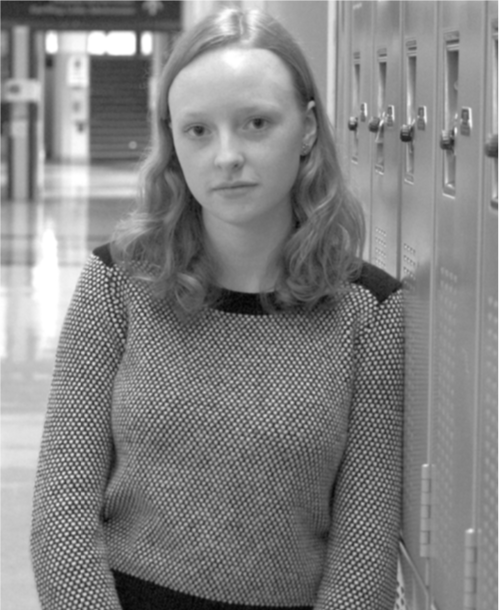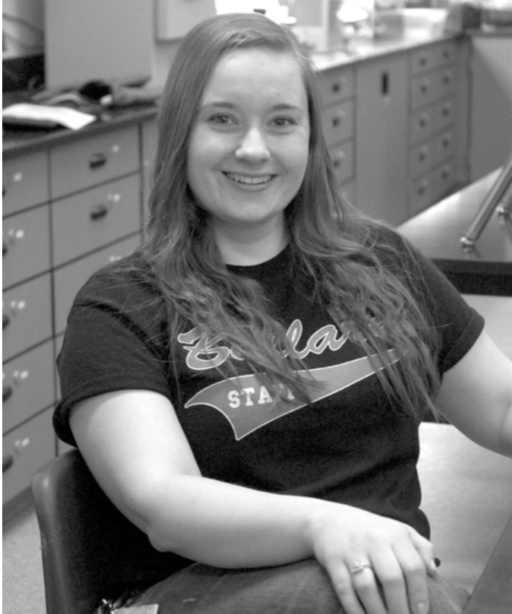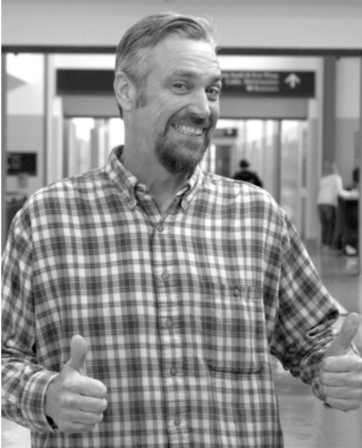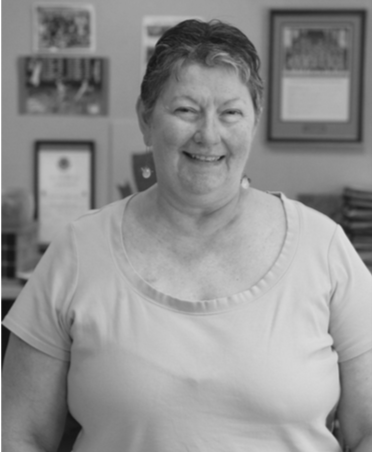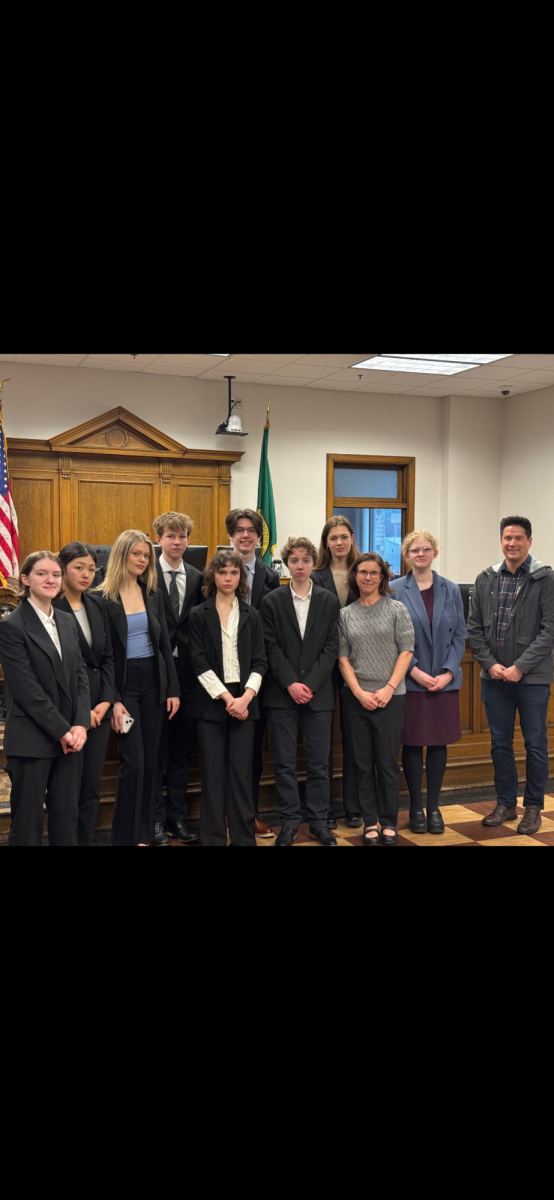Students and staff members share their experiences with cancer
Eleanor Dudley, Features Editor
Originally published January 12, 2017
Eleanor James, Senior (Miles Whitwoth)
When I was in second grade, my grandma was diagnosed with a rare and aggressive cancer, with a less-than-encouraging survival rate. Nine years, several surgeries and rounds of chemotherapy later, she’s still living life to its fullest. Although she walks with a cane, she spends the summer floating on an air mattress, going on rides at the fair my sister was too afraid to get on and bouncing on our trampoline.
Her story is one of many within our community. According to the Washington State Department of Health there are on average 10,697 annual incidences of cancer in King County, of which 2,934 are fatal. It is clear that many lives have been touched by cancer.
Our school is not immune. Science teacher Nell Niewiadomski, senior Eleanor James, maritime teacher John Foster and secretary Vivian Belcher all shared their experiences with cancer.
Nell Niewdomski, Science teacher (Miles Whitworth)
Niewiadomski was never affected by cancer until her late twenties. During her first year at BHS that was changed when former science teacher Megan Vogel passed away. Within a few years, cancer had crept in, first into her classroom, then her family and finally her best friend.
Two years ago her longtime friend Sarah passed away from melanoma. They had been best friends since high school, when they met working at the Redmond Town Center Gap. In the years since then, they celebrated the 10-year anniversary of their friendship and traveled to Mexico together. They never imagined the turn their friendship would take.
James also lost a loved one to melanoma. Her grandpa passed away last year, months after James spent spring break traveling with him and her grandma, knowing the trip would be their last.
John Foster, Maritime teacher (Miles Whitwoth)
Fractured Future
One of the hardest parts for both Niewiadomski and James was the altering of their expectations for the future. They had dreams and plans that would never be realized, and there’s a permanently empty spot at the table of their future celebrations.
“When I get married she would’ve been my bridesmaid and now she won’t be,” Niewiadomski said. “You planned your life around having these old girlfriends forever or going to your cousin’s wedding or your aunt being there when you have grandkids and they’re not there.”
James felt a similar disappointment. “I think about things like ‘Grandpa would be proud of me if I did this thing,’” James said. “I think about how I’ll be graduating soon and him not being there makes me really sad.”
Losing an individual
During their battles with cancer, both Niewiadomski and James recalled out of character behaviors from their loved ones as they slipped away. Physical deterioration
and increasing dependence were also difficult parts of the journey.
“It’s really hard to see someone that you knew — like who they were- — and they’re not there anymore,” Niewiadomski said.“It was very hard to watch somebody have to go through that, like be in diapers and no longer brushing their teeth and can’t get out of bed.”
In the moment
The climactic moment of their loved one’s departure is still the hardest part to talk about for Niewiadomski and James. James remembers that moment with regret, because she returned too late to be there for her grandpa’s passing, after having gone home earlier in the day to watch the movie, “The Sisterhood of the Traveling Pants.”
“I just hate myself for having gone home from the hospital and just watching that movie that I could watch any other time and not having been there,” James said. The moment was emotionally overpowering for James. “I remember walking into the stairwell and just sobbing and being so angry and not understanding or knowing what to think,” James said. “I was in shock. No one else in my life had ever died and I just didn’t understand.”
Remembering little things
In the aftermath of loss, it’s the small things that reopen the wound. Niewiadomski and James both mentioned details that still hurt them today.
“I can’t watch ‘Sex and the City’ because that was our thing. And so maybe in five years I can do that again,” Niewdomski said.
“Getting his phone calls—he’d call me Sugar—and not hearing his voice, there’s little things that you miss,” James said.
Vivian Becher, Secretary (Miles Whitwoth)
Finding closure
Despite medical efforts, death
is often a sad result of cancer. Niewiadomski and James know this all too well. Although the hurt is never fully gone, they have both resigned themselves to their loss, as one must.
“It’s been pretty gradual, just not seeing him and realizing, no he’s not on a vacation,” James said.
“Grief is a bitch. I feel bad for anyone who has lost somebody,” Niewiadomski said. “You have no idea when it’s coming and then it can show up at anytime. You have no way of knowing how long it’s going to hurt.”
Firsthand Experience
Due to modern medical advancements cancer isn’t always a death sentence. Many people live with cancer, and many recover. Here at BHS, secretary Vivian Belcher and maritime teacher John Foster are currently fighting cancer.
For the past three years Belcher has been battling ovarian cancer. She is continuing treatment and is doing better now than she was three years ago.
At the end of the last school year, Foster found a lump in his throat. It turned out to be cancer, and a surgery soon followed. He began treatment just as this school year was starting. He gave up some classes but continued teaching maritime, while undergoing treatment. Even though his treatment continues, he is back to working full time.
Treatment
Both Belcher and Foster agreed that undergoing treatment isn’t easy. “You just want to curl up in a ball and do nothing, but staying at home isn’t good either,” Belcher said. For Foster, the radiation therapy was the hardest part. Because of the radiation directed at his throat, he was unable to eat for three months, had a feeding tube and ended up losing 50 pounds.
“The cancer I don’t feel, I don’t notice, it was the treatment itself,” Foster said. “Things didn’t taste right, I had no appetite, the drugs numbed me up and I just didn’t feel like myself.”
Support
Both Belcher and Foster also mentioned that during these difficult times, the BHS community was very supportive. Throughout their treatment each continued to come to work everyday, showing strength, fortitude and perseverance. Belcher remarked on “how incredibly supportive BHS has been.”
Outreach
All of these people wanted to share their experiences with cancer because they wanted to spread awareness and understanding.
Niewiadomski sends the message through her biology classes, telling her students Sarah’s story, and teaching them the science behind cancer. “I brought the melanoma people in to outreach, to spread the message. It’s totally preventable, Sarah tanned when she was in high school and in her 20s, that was her thing and it killed her,” Niewiadomski said.
One of the reasons Foster agreed to share his cancer story was because he wanted to educate students. He suffers from throat cancer, an HPV strain that can be prevented with a vaccine.
“Its one of those things that if you think about it, it’s a vaccine against cancer,” Foster said. “And it has a great success rate.”
Takeaways
Each of these stories can inspire us as a community. They prompt us to be grateful for things both big and small. They are reminders to make the most of our time and remain steadfast in our hope.
While each story is unique and their outcomes are not the same, each is a portrait of the effect cancer has had on our community. They are all stories about our loved ones. Because it is the stories of lost loved ones that bring us to tears. And for those fighting cancer, it is the thought of their loved ones that emboldens them.
“Part of it is knowing I’ve got two great daughters and whatever happens to me they’ve got a great start in life,” Foster said. “That’s the hard part too, I don’t want to leave them.”
“I’ve got three grown kids and I want to be around, ” Belcher said. “My words of advice would be don’t give up…because I haven’t.
Fractured Future
One of the hardest parts for both Niewiadomski and James was the altering of their expectations for the future. They had dreams and plans that would never be realized, and there’s a permanently empty spot at the table of their future celebrations.
“When I get married she would’ve been my bridesmaid and now she won’t be,” Niewiadomski said. “You planned your life around having these old girlfriends forever or going to your cousin’s wedding or your aunt being there when you have grandkids and they’re not there.”
James felt a similar disappointment. “I think about things like ‘Grandpa would be proud of me if I did this thing,’” James said. “I think about how I’ll be graduating soon and him not being there makes me really sad.”
Losing an individual
During their battles with cancer, both Niewiadomski and James recalled out of character behaviors from their loved ones as they slipped away. Physical deterioration
and increasing dependence were also difficult parts of the journey.
“It’s really hard to see someone that you knew — like who they were- — and they’re not there anymore,” Niewiadomski said.“It was very hard to watch somebody have to go through that, like be in diapers and no longer brushing their teeth and can’t get out of bed.”
In the moment
The climactic moment of their loved one’s departure is still the hardest part to talk about for Niewiadomski and James. James remembers that moment with regret, because she returned too late to be there for her grandpa’s passing, after having gone home earlier in the day to watch the movie, “The Sisterhood of the Traveling Pants.”
“I just hate myself for having gone home from the hospital and just watching that movie that I could watch any other time and not having been there,” James said. The moment was emotionally overpowering for James. “I remember walking into the stairwell and just sobbing and being so angry and not understanding or knowing what to think,” James said. “I was in shock. No one else in my life had ever died and I just didn’t understand.”
Remembering little things
In the aftermath of loss, it’s the small things that reopen the wound. Niewiadomski and James both mentioned details that still hurt them today.
“I can’t watch ‘Sex and the City’ because that was our thing. And so maybe in five years I can do that again,” Niewdomski said.
“Getting his phone calls—he’d call me Sugar—and not hearing his voice, there’s little things that you miss,” James said.
Finding closure
Despite medical efforts, death
is often a sad result of cancer. Niewiadomski and James know this all too well. Although the hurt is never fully gone, they have both resigned themselves to their loss, as one must.
“It’s been pretty gradual, just not seeing him and realizing, no he’s not on a vacation,” James said.
“Grief is a bitch. I feel bad for anyone who has lost somebody,” Niewiadomski said. “You have no idea when it’s coming and then it can show up at anytime. You have no way of knowing how long it’s going to hurt.”
Firsthand Experience
Due to modern medical advancements cancer isn’t always a death sentence. Many people live with cancer, and many recover. Here at BHS, secretary Vivian Belcher and maritime teacher John Foster are currently fighting cancer.
For the past three years Belcher has been battling ovarian cancer. She is continuing treatment and is doing better now than she was three years ago.
At the end of the last school year, Foster found a lump in his throat. It turned out to be cancer, and a surgery soon followed. He began treatment just as this school year was starting. He gave up some classes but continued teaching maritime, while undergoing treatment. Even though his treatment continues, he is back to working full time.
Treatment
Both Belcher and Foster agreed that undergoing treatment isn’t easy. “You just want to curl up in a ball and do nothing, but staying at home isn’t good either,” Belcher said. For Foster, the radiation therapy was the hardest part. Because of the radiation directed at his throat, he was unable to eat for three months, had a feeding tube and ended up losing 50 pounds.
“The cancer I don’t feel, I don’t notice, it was the treatment itself,” Foster said. “Things didn’t taste right, I had no appetite, the drugs numbed me up and I just didn’t feel like myself.”
Support
Both Belcher and Foster also mentioned that during these difficult times, the BHS community was very supportive. Throughout their treatment each continued to come to work everyday, showing strength, fortitude and perseverance. Belcher remarked on “how incredibly supportive BHS has been.”
Outreach
All of these people wanted to share their experiences with cancer because they wanted to spread awareness and understanding.
Niewiadomski sends the message through her biology classes, telling her students Sarah’s story, and teaching them the science behind cancer. “I brought the melanoma people in to outreach, to spread the message. It’s totally preventable, Sarah tanned when she was in high school and in her 20s, that was her thing and it killed her,” Niewiadomski said.
One of the reasons Foster agreed to share his cancer story was because he wanted to educate students. He suffers from throat cancer, an HPV strain that can be prevented with a vaccine.
“Its one of those things that if you think about it, it’s a vaccine against cancer,” Foster said. “And it has a great success rate.”
Takeaways
Each of these stories can inspire us as a community. They prompt us to be grateful for things both big and small. They are reminders to make the most of our time and remain steadfast in our hope.
While each story is unique and their outcomes are not the same, each is a portrait of the effect cancer has had on our community. They are all stories about our loved ones. Because it is the stories of lost loved ones that bring us to tears. And for those fighting cancer, it is the thought of their loved ones that emboldens them.
“Part of it is knowing I’ve got two great daughters and whatever happens to me they’ve got a great start in life,” Foster said. “That’s the hard part too, I don’t want to leave them.”
“I’ve got three grown kids and I want to be around, ” Belcher said. “My words of advice would be don’t give up…because I haven’t.
Fractured Future
One of the hardest parts for both Niewiadomski and James was the altering of their expectations for the future. They had dreams and plans that would never be realized, and there’s a permanently empty spot at the table of their future celebrations.
“When I get married she would’ve been my bridesmaid and now she won’t be,” Niewiadomski said. “You planned your life around having these old girlfriends forever or going to your cousin’s wedding or your aunt being there when you have grandkids and they’re not there.”
James felt a similar disappointment. “I think about things like ‘Grandpa would be proud of me if I did this thing,’” James said. “I think about how I’ll be graduating soon and him not being there makes me really sad.”
Losing an individual
During their battles with cancer, both Niewiadomski and James recalled out of character behaviors from their loved ones as they slipped away. Physical deterioration
and increasing dependence were also difficult parts of the journey.
“It’s really hard to see someone that you knew — like who they were- — and they’re not there anymore,” Niewiadomski said.“It was very hard to watch somebody have to go through that, like be in diapers and no longer brushing their teeth and can’t get out of bed.”
In the moment
The climactic moment of their loved one’s departure is still the hardest part to talk about for Niewiadomski and James. James remembers that moment with regret, because she returned too late to be there for her grandpa’s passing, after having gone home earlier in the day to watch the movie, “The Sisterhood of the Traveling Pants.”
“I just hate myself for having gone home from the hospital and just watching that movie that I could watch any other time and not having been there,” James said. The moment was emotionally overpowering for James. “I remember walking into the stairwell and just sobbing and being so angry and not understanding or knowing what to think,” James said. “I was in shock. No one else in my life had ever died and I just didn’t understand.”
Remembering little things
In the aftermath of loss, it’s the small things that reopen the wound. Niewiadomski and James both mentioned details that still hurt them today.
“I can’t watch ‘Sex and the City’ because that was our thing. And so maybe in five years I can do that again,” Niewdomski said.
“Getting his phone calls—he’d call me Sugar—and not hearing his voice, there’s little things that you miss,” James said.
Finding closure
Despite medical efforts, death
is often a sad result of cancer. Niewiadomski and James know this all too well. Although the hurt is never fully gone, they have both resigned themselves to their loss, as one must.
“It’s been pretty gradual, just not seeing him and realizing, no he’s not on a vacation,” James said.
“Grief is a bitch. I feel bad for anyone who has lost somebody,” Niewiadomski said. “You have no idea when it’s coming and then it can show up at anytime. You have no way of knowing how long it’s going to hurt.”
Firsthand Experience
Due to modern medical advancements cancer isn’t always a death sentence. Many people live with cancer, and many recover. Here at BHS, secretary Vivian Belcher and maritime teacher John Foster are currently fighting cancer.
For the past three years Belcher has been battling ovarian cancer. She is continuing treatment and is doing better now than she was three years ago.
At the end of the last school year, Foster found a lump in his throat. It turned out to be cancer, and a surgery soon followed. He began treatment just as this school year was starting. He gave up some classes but continued teaching maritime, while undergoing treatment. Even though his treatment continues, he is back to working full time.
Treatment
Both Belcher and Foster agreed that undergoing treatment isn’t easy. “You just want to curl up in a ball and do nothing, but staying at home isn’t good either,” Belcher said. For Foster, the radiation therapy was the hardest part. Because of the radiation directed at his throat, he was unable to eat for three months, had a feeding tube and ended up losing 50 pounds.
“The cancer I don’t feel, I don’t notice, it was the treatment itself,” Foster said. “Things didn’t taste right, I had no appetite, the drugs numbed me up and I just didn’t feel like myself.”
Support
Both Belcher and Foster also mentioned that during these difficult times, the BHS community was very supportive. Throughout their treatment each continued to come to work everyday, showing strength, fortitude and perseverance. Belcher remarked on “how incredibly supportive BHS has been.”
Outreach
All of these people wanted to share their experiences with cancer because they wanted to spread awareness and understanding.
Niewiadomski sends the message through her biology classes, telling her students Sarah’s story, and teaching them the science behind cancer. “I brought the melanoma people in to outreach, to spread the message. It’s totally preventable, Sarah tanned when she was in high school and in her 20s, that was her thing and it killed her,” Niewiadomski said.
One of the reasons Foster agreed to share his cancer story was because he wanted to educate students. He suffers from throat cancer, an HPV strain that can be prevented with a vaccine.
“Its one of those things that if you think about it, it’s a vaccine against cancer,” Foster said. “And it has a great success rate.”
Takeaways
Each of these stories can inspire us as a community. They prompt us to be grateful for things both big and small. They are reminders to make the most of our time and remain steadfast in our hope.
While each story is unique and their outcomes are not the same, each is a portrait of the effect cancer has had on our community. They are all stories about our loved ones. Because it is the stories of lost loved ones that bring us to tears. And for those fighting cancer, it is the thought of their loved ones that emboldens them.
“Part of it is knowing I’ve got two great daughters and whatever happens to me they’ve got a great start in life,” Foster said. “That’s the hard part too, I don’t want to leave them.”
“I’ve got three grown kids and I want to be around, ” Belcher said. “My words of advice would be don’t give up…because I haven’t.
























